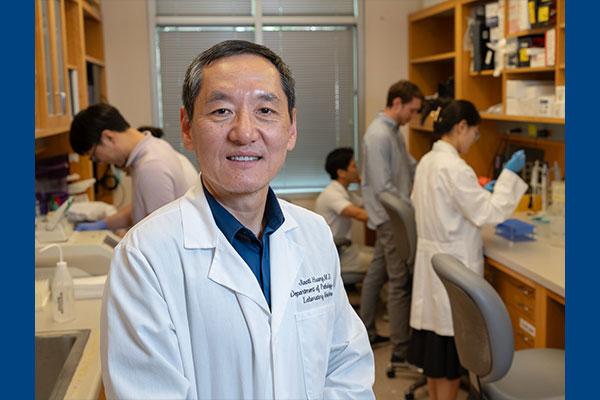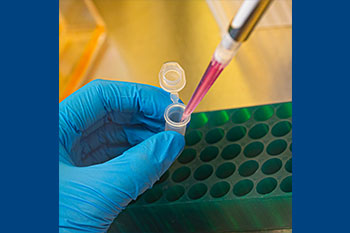Outsmarting Prostate Cancer's Evasive Cells: Dr. Jiaoti Huang

Since joining Duke in 2016, Jiaoti Huang, MD, PhD, has been a pivotal leader, mentor, and scientist. As an internationally renowned surgical pathologist and prostate cancer researcher for over 20 years, Huang is a leading authority in studying molecular mechanisms, biomarkers, and novel therapeutics for prostate cancer.
He has collaborated with Duke Cancer Institute’s (DCI) Center for Prostate and Urologic Cancers to address these challenges. The prostate cancer experts at the Center are members of Duke’s nationally-ranked urology and medical oncology programs, who specialize in difficult-to-treat cancers.
His pioneering work has identified a subset of prostate cancer cells, called neuroendocrine cells, or NE cells, as a crucial component of prostate cancer. NE cells do not express the androgen receptor, a common target for treatment, and are resistant to hormonal therapy. Huang’s team discovered that the NE cells express a receptor called CXCR2, which is critical for NE cell function. This work has led to a clinical trial at Duke to test the efficacy of a CXCR2 inhibitor in treating advanced prostate cancer, supported by a multi-million dollar grant from the NIH.

Huang is also a dedicated educator, having trained numerous residents, fellows, graduate students, and postdoctoral fellows, many of whom have gone on to make significant discoveries in the field of pathology and prostate cancer research, continuing his legacy of impactful mentorship.
Looking ahead, he hopes to attract broad funding from the federal government, private foundations, and industry partners to support his ambitious goal of moving many of his discoveries to the clinic quickly to help many patients who have exhausted treatment options. In fact, at the end of 2023 the Huang Lab received a $1 million-dollar anonymous donation of unrestricted funds to support his creative research initiatives (see feature in this issue titled “Philanthropy Moves the Needle on Creating Novel Therapies for Prostate Cancer”).
This donation “will allow us to do the most innovative work that is high risk and high reward,” Huang explained.
“We’re very excited about our direction and feel fortunate about the support by the department’s infrastructure and other resources established by department faculty, trainees, and staff that are essential to our success,” he said.
Highlighted Awards and Honors:
Highlighted Awards and Honors:
- Harold Cummins endowed lecture, Department of Structural & Cellular Biology, Tulane University School of Medicine, New Orleans, LA, October 2022
- The inaugural Endowed Dr. Anthony and Helen Torre Lecture, East Virginia Medical School, Norfolk, VA, March, 2023
- National Institutes of Health (NIH) Grant titled “Glutaminase I Isoforms as Personalized Biomarkers of Prostate Cancer”
- NIH grant titled “The Role of Focal Adhesion Kinase in Therapy Resistant Prostate Tumors”
- NIH grant titled “Developing A Novel Combinatorial Therapy for Lethal Neuroendocrine Prostate Cancer”
- Prostate Cancer Foundation Challenge Award titled “Targeting Neuroendocrine Cells in Prostate Cancer with Small Molecule and Targeted Radionuclide Therapies”
- Huang is frequently invited to give lectures to share his expertise regarding prostate cancer research at prestigious organizations such as MD Anderson Cancer Center (the highest-ranked cancer center in the country); University of California, San Diego; Weill Cornell College of Medicine; and at events like the 29th Annual Prostate Cancer Foundation Scientific Retreat and 6th Broadmoor GU Summit.